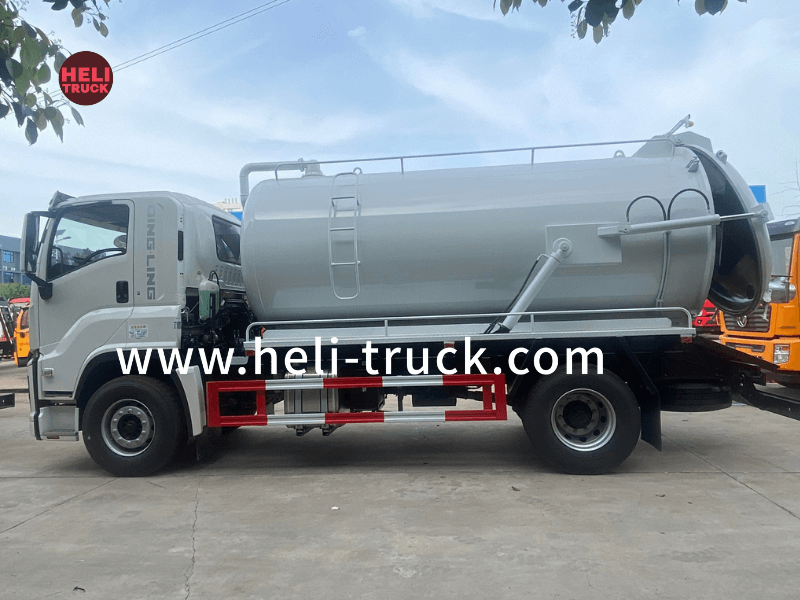Efficient Waste Management The Role of Garbage Compactor Trucks for Hazardous Materials

Introduction
Waste management is a critical aspect of maintaining a clean and sustainable environment. Hazardous materials, in particular, pose significant challenges due to their potential impact on human health and the environment. Garbage compactor trucks specifically designed for hazardous materials play a crucial role in ensuring the safe collection and disposal of such waste. This article will explore the importance of garbage compactor trucks for hazardous materials, their design and operation, as well as their impact on waste management practices.
Importance of Garbage Compactor Trucks for Hazardous Materials
Hazardous materials encompass a wide range of substances that can pose serious risks if not handled properly. These materials include chemicals, pharmaceuticals, radioactive waste, and other substances that can be harmful to human health and the environment. Proper disposal of hazardous waste is essential to prevent contamination of soil, water, and air, as well as to protect the health and safety of waste management workers and the general public.
Garbage compactor trucks designed for hazardous materials are specially equipped to handle and transport such waste safely and efficiently. These vehicles are equipped with features such as sealed compartments, leak-proof containers, and specialized handling equipment to prevent spills and exposure to hazardous substances. By using garbage compactor trucks for hazardous materials, waste management companies can ensure that these materials are collected, transported, and disposed of in compliance with regulations and best practices.
Design and Operation of Garbage Compactor Trucks for Hazardous Materials
Garbage compactor trucks for hazardous materials are designed with safety and efficiency in mind. These vehicles are typically equipped with a sealed compartment for storing hazardous waste, as well as a hydraulic compactor for reducing the volume of waste collected. The sealed compartment prevents leaks and spills during transportation, while the compactor helps to maximize the storage capacity of the truck and reduce the number of trips required for waste collection.
In addition to the sealed compartment and compactor, garbage compactor trucks for hazardous materials are also equipped with specialized handling equipment, such as cranes, hoists, and pumps, to facilitate the safe loading and unloading of waste. These vehicles may also feature advanced safety systems, such as gas detection sensors, fire suppression systems, and emergency shut-off controls, to prevent accidents and protect workers from exposure to hazardous materials.
The operation of garbage compactor trucks for hazardous materials requires specialized training and certification due to the risks involved in handling such waste. Waste management companies must ensure that their personnel are properly trained in the safe handling and disposal of hazardous materials, as well as in the operation of the equipment and safety systems on the garbage compactor trucks. Regular maintenance and inspection of the vehicles are also essential to ensure their continued safe and efficient operation.
Impact of Garbage Compactor Trucks for Hazardous Materials on Waste Management Practices
Garbage compactor trucks for hazardous materials have a significant impact on waste management practices, both in terms of safety and efficiency. By using specialized vehicles for the collection and transportation of hazardous waste, waste management companies can minimize the risks of exposure to harmful substances and reduce the likelihood of accidents and spills. This not only protects the health and safety of workers but also helps to prevent environmental contamination and public health risks.

In addition to improving safety, garbage compactor trucks for hazardous materials also contribute to the efficiency of waste management practices. By reducing the volume of waste collected through compaction, these vehicles can maximize the storage capacity of the truck and minimize the number of trips required for waste collection. This results in cost savings for waste management companies and reduces the environmental impact of transporting hazardous materials.
Furthermore, garbage compactor trucks for hazardous materials play a crucial role in ensuring compliance with regulations and best practices for the handling and disposal of such waste. By using specialized vehicles that are designed and equipped to meet regulatory requirements, waste management companies can avoid fines and penalties for non-compliance and demonstrate their commitment to environmental stewardship. This helps to build trust with regulators, customers, and the public, and enhances the reputation of the company in the waste management industry.
Garbage truck waste handling for hazardous materials play a vital role in ensuring the safe and efficient collection and disposal of hazardous waste. These specialized vehicles are designed with safety and efficiency in mind, equipped with features such as sealed compartments, hydraulic compactors, and specialized handling equipment to prevent spills and exposure to hazardous substances. By using garbage compactor trucks for hazardous materials, waste management companies can improve safety, efficiency, and compliance with regulations, while also reducing the environmental impact of transporting such waste. Overall, garbage compactor trucks for hazardous materials are an essential tool in the arsenal of waste management practices, helping to protect human health and the environment from the risks posed by hazardous materials.
